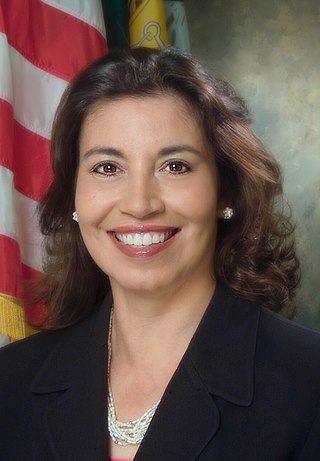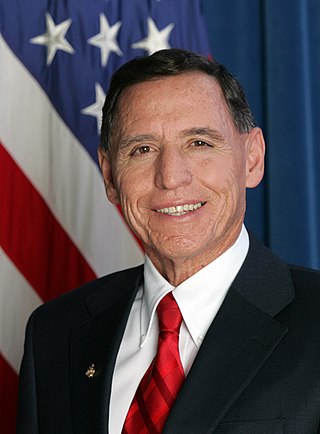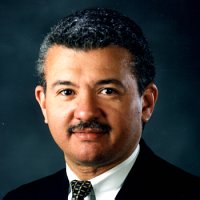
Henry Gabriel Cisneros is an American politician and businessman. He served as the mayor of San Antonio, Texas, from 1981 to 1989, the second Latino mayor of a major American city and the city's first since 1842. A Democrat, Cisneros served as the 10th Secretary of Housing and Urban Development (HUD) in the administration of President Bill Clinton from 1993 to 1997. As HUD Secretary, Cisneros was credited with initiating the revitalization of many public housing developments and with formulating policies that contributed to achieving the nation's highest ever rate of home ownership. In his role as the President's chief representative to the cities, Cisneros personally worked in more than two hundred cities spread over all fifty states. Cisneros's decision to leave the HUD position and not serve a second term was overshadowed by controversy involving payments to his former mistress.

Anna Escobedo Cabral is an American politician who served as the Unit Chief for Strategic Communications in the External Relations Division of the Inter-American Development Bank (IDB) from 2009 to 2018. Today, she and her husband serve as partners of the Cabral Group, a consulting and public policy firm. She also serves as an independent director for Navient, a member of the Comcast NBCU diversity council, and as an advisor to the Libra Group, and Valaurum. Her current nonprofit commitments include serving as chair of the BBVA Microfinance Foundation, chair of the Jessie Ball duPont Fund, and Treasurer of Lideramos, a national Latino organization focused on providing leadership training to grassroots community advocates. Prior to joining the IDB, Cabral served as the 42nd Treasurer of the United States from January 19, 2005, to January 20, 2009. She became the highest-ranking Latina in the George W. Bush administration after the resignation of Rosario Marin.
In the United States, a presidential commission is a special task force ordained by the president to complete a specific, special investigation or research. They are often quasi-judicial in nature; that is, they include public or in-camera hearings.

Raul Humberto Yzaguirre is an American civil rights activist. He is a life member of the Council on Foreign Relations. He served as the president and CEO of the National Council of La Raza from 1974 to 2004 and as U.S. Ambassador to the Dominican Republic from November 2010 to May 2013.

Linda Alvarado is President and Chief Executive Officer of Alvarado Construction, Inc., a large commercial and industrial general contracting/site management and design/build firm in Denver, Colorado. She is also President of Palo Alto, Inc., co-owner of the Colorado Rockies baseball team, and currently a member of the board of 3M.

Lisette Nieves is an American academic, non-profit leader, and public official. She is the president of the Fund for the City of New York and a Distinguished Clinical Instructor with New York University. In July 2022, she became a U.S. Senate-confirmed member of the board of directors of AmeriCorps.

Robert Winton Mendenhall is a pioneer of educational technology and entrepreneurship best known as the former president of Western Governors University (WGU).

Anna Diamantopoulou is a Greek civil engineer and politician of the Panhellenic Socialist Movement (PASOK) who currently serves as president of the Athens-based think tank "DIKTIO" Network for Reform in Greece and Europe.

The formation of a Commission on the Future of Higher Education, also known as the Spellings Commission, was announced on September 19, 2005, by U.S. Secretary of Education Margaret Spellings. The nineteen-member commission was charged with recommending a national strategy for reforming post-secondary education, with a particular focus on how well colleges and universities are preparing students for the 21st-century workplace, as well as a secondary focus on how well high schools are preparing the students for post-secondary education. In the report, released on September 26, 2006, the Commission focuses on four key areas: access, affordability, the standards of quality in instruction, and the accountability of institutions of higher learning to their constituencies. After the report's publication, implementation of its recommendations was the responsibility of U.S. Under Secretary of Education, Sara Martinez Tucker.

The National Commission on Libraries and Information Science (NCLIS) was an agency in the United States government between 1970 and 2008. The activities of the Commission were consolidated into the Institute of Museum and Library Services. Records of NCLIS are held at the U.S. National Archives and Records Administration and the University of Michigan Library, Special Collections as part of the Power Collection for the Study of Scholarly Communication and Information Transfer.

Leslie Sanchez is an American author, political pundit affiliated with the Republican Party, and founder/CEO of Impacto Group LLC, a Washington, D.C.-based market research and consulting firm.

Henry Lozano is a non-profit executive and grassroots organizer. His years of public service culminated in his post at the White House as Deputy Assistant to the President and Director of USA Freedom Corps. On August 10, 2011, he was appointed to serve as the Director of Los Angeles County Teen Challenge and Urban Ministries Initiatives.

Gilbert F. Casellas is an American lawyer and businessman. He is a private investor and business consultant in the Washington, D.C. area, a director of Prudential Financial, trustee of the University of Pennsylvania, and advisor to Toyota Motor North America, The Procter & Gamble Company, and Comcast Corporation. He is a member of the Council on Foreign Relations, the American Law Institute, trustee of the Pan American Development Foundation and Co-Editor-in-Chief of Workplace Harassment Second Edition 2018 published by Bloomberg Law.
Cesar Conde is an American media executive currently serving as chairman of the NBCUniversal News Group, overseeing NBC News, MSNBC, and CNBC. Prior to this, Conde was chairman of NBCUniversal International Group and NBCUniversal Telemundo Enterprises. Before that, he was president of Univision's networks division.

The White House Initiative on Asian Americans, Native Hawaiians, and Pacific Islanders (WHIAANHPI) is a United States governmental office that coordinates an ambitious whole-of-government approach to advance equity, justice, and opportunity for Asian Americans, Native Hawaiians, and Pacific Islanders. The Initiative collaborates with the Deputy Assistant to the President and AA and NHPI Senior Liaison, White House Office of Public Engagement and designated federal departments and agencies to advance equity, justice, and opportunity for AA and NHPIs in the areas of economic development, education, health and human services, housing, environment, arts, agriculture, labor and employment, transportation, justice, veterans affairs, and community development.

Adena Williams Loston is the 14th president of St. Philip’s College. She was installed as the new president in ceremonies on March 1, 2007. St. Philip’s College, located in San Antonio, Texas, is the only historically Black college and Hispanic-serving institution in the United States.
The Hispanic Federation (HF) is a U.S based non-governmental organization focused on supporting Hispanic communities through local, state, and national advocacy. The Federation was founded in New York City in 1990 by a small group of Latino leaders, establishing initiatives to advocate for the interests of the Hispanic community and has expanded to establish programs, and policies in 16 states. The organization's objective is to empower and advance the Hispanic community primarily through service pillars, membership services, advocacy, and community programs. The Federation has formed relationships with a network of 100 Latino grassroots nonprofits, as well as collaborating with organizations, government officials, and private sector partners to enact systemic change related to a variety of socioeconomic issues for Hispanic communities. The Federation has gained national recognition for its work in areas of education, health, immigration, economic empowerment, civic engagement, environment, and organizational development to strengthening Latino institutions to ultimately increase the quality of life within Hispanic communities.

The following is a timeline of the presidency of Jimmy Carter, from January 1, 1980, to January 20, 1981.
Waldemar "Bill" Rojas is a former superintendent at the San Francisco Unified School District (SFUSD) and the Dallas Independent School District (DISD).
Excelencia in Education, also referred to as Excelencia, is an American non-profit organization founded in 2004 by Sarita E. Brown and Deborah A. Santiago. It is classified as a Research Institute and Public Policy Analysis group focused on Educational Institutions. Excelencia's stated mission is to "accelerate Latino student success in higher education". Excelencia's research is conducted to gather information on the relationship between Latino students and their programs, and is published through Education Resources Information Center (ERIC), and educational journals, such as Insight into Diversity and Diverse: Issues in Higher Education. Excelencia regularly recognizes programs and institutions that support the Latino community through higher education. Excelencia publishes an annual list of Hispanic Serving Institutions and emerging Hispanic Serving Institutions.


















